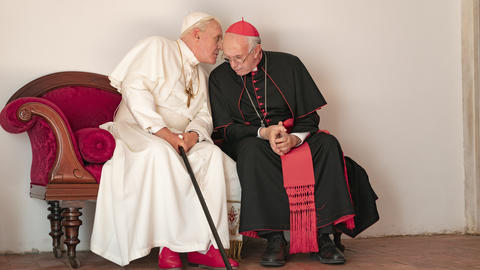
Thought In Action: The Two Popes
Posted on Thu 5 Dec 2019
In the third instalment of Thought In Action, UWE's Suwita Hani Randhawa and a selection of panellists discuss the themes raised in Fernando Meirelles’ film ‘The Two Popes’. UWE BA philosophy student Georgia Harrison shares her thoughts on the captivating film which centres on ‘the two popes’ Benedict XVI and Francis and their relationship with their faith.
Through their mutual devotion to the Catholic faith, retiring – and we are repeatedly told that a Pope cannot retire – Pope Benedict XVI (Anthony Hopkins) and his successor, Cardinal Jorge Bergolio (Jonathan Pryce) ultimately taking on the title of Pope Francis, develop a heart-warming, although initially unexpected, friendship. Raised in the discussion by John P. Falcone from the Union Theological Seminary, the film depicts two approaches to spirituality. Through Pope Francis, we see the embracing of ordinary and modest life amongst his people; a passion for tango, for music, football and a universal journey of love and heartache we can all relate to. The second being through Pope Benedict XVI, preoccupied with upholding the name of the Catholic Church that his isolated way of life was conservative to say the least. Their opposing approaches to their faith and political ideologies mirror that of contemporary society. What is revealed is that even those appointed to provide a path to their flock also struggle to know the way.
Written by Anthony McCarten (The Theory of Everything) and directed by Fernando Meirelles (City of God), the film explores a journey of friendship founded on a spiritual and political plane. This beautifully crafted drama is inspired by true events but does not shy away from artistic license. We are made aware of their foreboding struggles through the use of ABBA’s ‘Dancing Queen’ which couldn’t help but make me question whether Pope Benedict XVI and Cardinal Bergoglio (Pope Francis) were indeed “having the time of their lives”? It became apparent they were not. When in the face of their sins, they both were struggling. Our Two Popes bond over their relationship with their personal demons and their confidence in upholding the name of the Catholic Church.
Mentioned by Tina Beattie (University of Roehampton) was the never-ending life of the Catholic Church. The Church undergoes a continual change and this is depicted to us through the contrasting views of our Two Popes. Whilst its organic structure changes, meaning who currently holds the role of Pope along with their own political views, the Church still keeps its DNA. Despite the film expertly highlighting the Church’s internal change of the voice, it shies away from the Church’s stagnation in response to societal changes, namely discussion around the acceptance of homosexuality; and does not address recent scandals within Catholic history with conviction. The film momentarily sheds light on the child abuse cases through the troubled eyes of Pope Benedict. However, the lack of focus on this reflects the Catholic Church’s own failure to recognise the weight of the scandals and be able to heal and move forward. Throughout the film, Pope Benedict XVI wears a Fitbit that nags him to ‘keep moving’, the irony’s not lost of us that he’s not moving with societal changes.
Beattie raises that the film is a little too soft focused, stating that the film had many other possible avenues it could have explored that could’ve strengthened its informative value. George Ferzoco (University of Bristol) within the discussion highlights a ‘big weakness’ being the lack of exploration of the concept of ‘papa Emeritus’ – what Pope Benedict XVI chose to be referred to after his resignation, meaning that he can still “stick his oar in” with regards to how to Church is run.
McCarten’s dialogue is light, witty, entertaining is juxtaposed with scenes of Bergolio’s past indiscretions, primarily him not denouncing Argentina’s military junta of 1976. The film illuminates the relevance of one’s past to their present and future and its effect on a person’s faith. The power of guilt towards one’s own discretions can leave you struggling to hear the voice of God, which was ingeniously alluded to us through McCarten’s writing in the voice of Pope Benedict XVI, who claimed he may need a “spiritual hearing aid”.
Approaching the end of the film, you are provided with a foundation of knowledge to support you on your own investigative journey into the Church but in a way that is funny and pulls at your heart strings. It leaves you with an insightful gaze into people’s relationship with faith and the intricacy of the challenges that arise.
This article was written by UWE BA Philosophy student Georgia Harrison @Thought_In_Act
